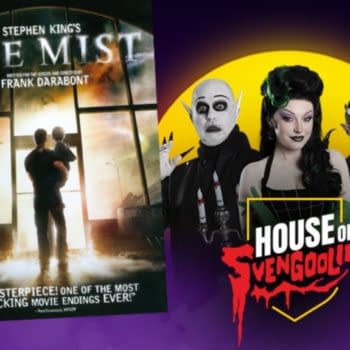Posted in: Movies, Recent Updates | Tagged: Chris Hood, entertainment, film, indie filmmaking, Robin Hood Films
Film Schooling – Insider Insights On Indie Filmmaking Part 3 : Developing The Investor Prospectus
By Chris Hood
(This is Part Three of an ongoing series to help educate aspiring filmmaker on the process of making their first film. Previous articles in this series can be found at BleedingCool.com and MovieIndustry.com)
If you've been following my previous supra-genius advice in this series (yes, I tested at Wile E. Coyote levels.), you now have the script you want to shoot and a complementary producing partner for your film. Now comes the hardest part. Please know now that there is no "easy" part. Filmmaking is grueling. There are moments of fun and even bliss and it can be rewarding and lucrative, but it's never "easy." Make no mistake, getting the money for a film is almost always the hardest part. If it's not hard, you should have tried to get more… (Selling your film is the other hardest part, but we'll get to that in time.)
Now, we're going to assume you don't have a rich uncle or trust fund you can raid to finance your film. If for some reason that is your case, good for you (and by the way, the rest of us hate you). In the real world, you have to go out and find the money. If this is your first film, there is actually one advantage you have that we'll get to in Part Four.
Before you can go out and solicit money for your opus, you need a strategy. This is one of those places where the smart business partner will be able to contribute. You'll need a prospectus showing potential investors what you're planning on doing, how you're going to go about it and why it's a good investment for them. For the record, filmmaking is a terrible investment. Terrible. And I mean like on the level of penny stocks awful. Like loading up on Twinkies after hearing Hostess was going under. Like betting the "over" on how long Chris Brown goes before beating up another woman. The reason I bring this up is because although it's painfully true, it can be overcome. Almost all first-time films lose money. And by "almost all" I would estimate 99% and that's not an exaggeration. Almost. Every. One.
So for the sake of education, let's take a detour to touch on the topic of why almost every first-time film is a financial disaster for the people who make and invest in it:
#1: The film doesn't get finished. This is actually a larger number than you would expect. Films run out of money and people lose interest. It's not uncommon for a small film to drag out for two or three years or more. Five plus years isn't terribly uncommon. It takes a hell of a lot of fortitude to stick with something that has required such a massive financial and time investment and that has returned absolutely nothing to date (like a marriage to Heather Mills), which is why so many projects are abandoned.
#2: The film is bad. Yes, "bad" is a subjective term, so it's probably more appropriate to say the film doesn't meet a minimum threshold of professionalism. This is the result of incompetence and/or delusions of grandeur (think Ed Wood or Uwe Boll). There are a surprising number of people who decide to make a film that have no experience whatsoever. Having seen 5000 films does not qualify you to make a good one any more than reading 5000 books makes you a good novelist. No matter how ambitious, a team of inexperienced, untrained neophyte film wannabes will fail every time. So if you know nothing about making a film, you need to make damn sure you hire people who do.
#3: The sales approach suffers from bad marketing. When the film is done and it's time to get a distributor or sales agent, far too many drop the ball horribly. I see this often. Every. Day.
#4: The distribution agreement ass rapes you. Most distribution and sales agent agreements fuck over the filmmaker. That is a terrible, unfortunate, dirty little not-so-secret of this business.
I won't go into detail here on #3 and #4 as we'll touch on those more later in this series. The first two are the ones you need to fear at this stage.
So let's get back on point. What do you need in your prospectus? You need whatever it takes to get your investors excited about the film and give them the idea that it's a decent investment. At this point, it's about sales. You're selling the project and you're selling yourself. In many cases it's the latter that will get you the money. If you can't sell yourself or you're not good at sales in general, someone else should be leading this charge (again, this is why there should be a businessperson in the mix).
I've seen hundreds of prospectuses for film and they range from slick, smart and successful to "what retard put this together?" Your prospectus is an extension of you and reflects on you and every member of your team. It needs to look professional. If you're trying to raise $500k to make a film, your business plan should be as impressive as if you were trying to raise $500k for a restaurant or any other endeavor. This is business. You can hope the business side is secondary to the investor, but there's no reason to not take this approach…and there's no excuse for it.
Here are the items I recommend in an investor proposal:
1. A "concept" poster. Give them something tangible. Something real. Show them what the poster might look like when they show up to the big premiere (but don't tell them it will probably be 4 years from now). If this looks professional, it will feel like a "real" movie. I can't express how important a good poster is. Find a way to get something as slick as possible. It's money well spent.
Note: A poster needs to be done by a graphic artist. Period. I don't care how good you are with creating Facebook memes with Photoshop, if you're not a graphic artist, fine one! Here is an example of what NOT to do: [Christmas Ride movie poster here]
2. A synopsis/outline/treatment. Keep this short. A page at most. It can be a half page or even a paragraph. Make a note that the screenplay is available upon request but stick to the adage – "Leave them wanting more." Tease them a bit.
3. Biographies of the key people involved (optional). You can mention you went to film school and where. Mention a few of the films you've worked so the prospective investor knows you're not completely green. Let the reader know why you're qualified doing the task you'll be doing on the film. We don't need to know the writer had poetry published in his college magazine. We don't need to know the producer was a personal driver for Joan Collins. Stay focused. Tell us why you're qualified. If you can't, you probably aren't.
4. Budget. Money people need to see this. It shows them you know your shit. If you're asking for $500k, an investor is going to want to know "Why $500k and not $450k or $550k?" Is that number arbitrary? At this point you don't need a fully itemized 15 page budget (at least not in the proposal), but at least what's called a "top sheet" from the budget with amounts for the main categories and totals.
5. Terms. What does the investor get for his money and how can he expect to be paid back? A common structure is for the investor(s) to receive all revenues until he's been paid back 110% and from there share in 50% of all additional revenues. This is the closest thing to a "norm," but it comes down to whatever you and the other party(ies) agrees to.
What to avoid:
1. Comparables. This is used all the time and the reality is, it's completely useless and utterly subjective (unless it's a calculated tease and/or false promise). It seems every filmmaker with a business plan for a horror film includes information about The Blair Witch Project and Paranormal Activity as if those are the "norms" of indy filmmaking in the horror genre. Some people take this approach to hook investors. I find it disingenuous as the comparables are always success stories which is a bit deceptive. On the other hand, sales expectations are fine if they're realistic. Do your research. Come up with numbers for domestic (theatrical, if that's a possibility, VOD, DVD, cable, etc.) and foreign sales. This information is out there. Find it.
2. Biographies of supporting team members. Far too often I see pages and pages about the writer, director, producers, department heads and actors whom no one has ever heard of. This is filler and it's obviously filler if the bios are for people who have never done anything before. I sometimes see entire pages devoted to the composer or make-up artist or associate producer, complete with photo. Why is this in there? Is an investor supposed to be impressed that you have a guy willing to be gaffer on your film? If I put together a restaurant proposal, I might mention the chef and the G.M. I'm not going to have a bio for the hostess or the day manager. Now, if your make-up artist is an Oscar winner and you're doing a zombie film, that's worth a mention. If your composer did the score for Avatar, probably worth a plug as well. Be smart about it.
3. Biographies of D-list (and below) talent. Some proposals will have several pages with pictures and bios of actors whom readers have never seen or heard of. Unless you're doing this to bait investors, and there are times for that, avoid it. When people think of movies, they think of movie stars. Don't remind them that it's "not that kind of film". When it comes up, and it will, be honest and if you aren't budgeting for name talent, you can say that. Now, if your main prospective investor happens to be dating the cute, young lady you're willing to cast if he ponies up the dough, treat her like an A-lister in the business plan. If your biggest name was on one season of Star Trek: Voyager from 2007-2008, that is not a "name" star. He's probably not worth including (again, unless a prospective investor is a Trekkie).
Now, you can put "hopeful" or "tentative" casting decisions, but I warn about being dishonest here. If you tease about getting Paul Giamatti and end up with Paul Bettany, that's okay. If you promise Tom Hanks and cast Tom Arnold, prepare for some pissed off investors.
4. The contract. You should always have something legal in hand ready to go, but it shouldn't be part of the proposal. It should also be approved by a lawyer (and I can already hear the groans about this). Yes, lawyers suck. We all know this. And they're overpriced. And they smell like cabbage. We don't like dealing with them. But wait until you start talking to some "name" actor that wants $10,000 a day along with a list of demands…you'll start wishing you could trade those prima donnas 1 for 2 with those scumbag lawyers! (apologies for being redundant)
There are certainly other things that can be included and others that definitely don't belong. Use common sense and the best rule (again) is to prepare a prospectus like it was for any other "real" business.
In the broadest possible strokes – make it exciting, make it interesting, make it professional and be honest. Once you have this masterpieces of manipulation in your hands, it's time to use it to your devious devices. Enter Part Four…coming soon.
Chris Hood is a writer, producer and director of such films as "Counterpunch" starring Danny Trejo and "Dirty Dealing 3D" with Michael Madsen and C. Thomas Howell. He is also owner of Robin Hood Films, a Las Vegas-based distribution company representing English language films around the world and operates a film blog at MovieIndustry.com. He's also dead sexy. (Mr. Hood denies any involvement in the creation of this mini-bio.)

















